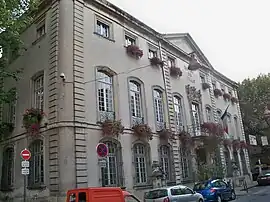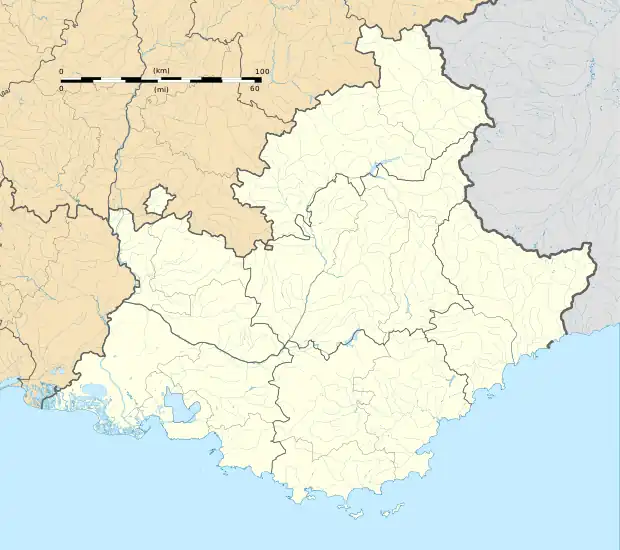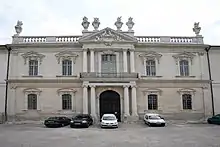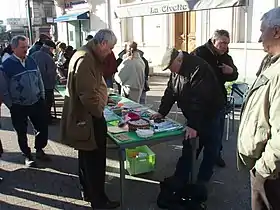Carpentras
Carpentras (French pronunciation: [kaʁpɑ̃tʁa], formerly [kaʁpɑ̃tʁas];[3] Provençal Occitan: Carpentràs in classical norm or Carpentras in Mistralian norm; Latin: Carpentoracte) is a commune in the Vaucluse department in the Provence-Alpes-Côte d'Azur region in southeastern France.
Carpentras | |
|---|---|
Subprefecture and commune | |
 Town hall | |
.svg.png.webp) Coat of arms | |
Location of Carpentras | |
 Carpentras  Carpentras | |
| Coordinates: 44°03′21″N 5°02′56″E | |
| Country | France |
| Region | Provence-Alpes-Côte d'Azur |
| Department | Vaucluse |
| Arrondissement | Carpentras |
| Canton | Carpentras |
| Intercommunality | CA Ventoux-Comtat Venaissin |
| Government | |
| • Mayor (2020–2026) | Serge Andrieu[1] |
| Area 1 | 37.92 km2 (14.64 sq mi) |
| Population | 29,865 |
| • Density | 790/km2 (2,000/sq mi) |
| Time zone | UTC+01:00 (CET) |
| • Summer (DST) | UTC+02:00 (CEST) |
| INSEE/Postal code | 84031 /84200 |
| Elevation | 56–212 m (184–696 ft) (avg. 95 m or 312 ft) |
| 1 French Land Register data, which excludes lakes, ponds, glaciers > 1 km2 (0.386 sq mi or 247 acres) and river estuaries. | |
As capital of the Comtat Venaissin, it was frequently the residence of the Avignon popes; the Papal States retained possession of the Venaissin until the French Revolution. Nowadays, Carpentras is a commercial center for Comtat Venaissin and is famous for the black truffle markets held from winter to early spring.
Carpentras briefly held France's all-time high-temperature record, during the heatwave of June 2019.[4]
History
Classical antiquity
.jpg.webp)
Carpentras was a commercial site used by Greek merchants in ancient times, and known to Romans at first as Carpentoracte Meminorum, mentioned by Pliny, then renamed Forum Neronis ("Forum of Nero"); the city retains an impressive Roman triumphal arch, that has been enclosed by the bishops' palace, rebuilt in 1640, now a law court, and a machicolated city gate, the Porte d'Orange.

Ancient Diocese of Carpentras
For the history of the bishopric of Carpentras, see Ancient Diocese of Carpentras.
Middle Ages
At the beginning of the Avignon Papacy, Pope Clement V took up residence, along with the Roman Curia, in Carpentras in 1313. His successor, Pope John XXII, settled definitively at Avignon.
Municipal library
Joseph-Dominique d'Inguimbert, Bishop of Carpentras from 1735 to 1754, established a great scholarly library which Jean-François Delmas, the chief librarian as of 2009, has called "the oldest of our municipal libraries"; known as the Bibliothèque Inguimbertine and now holding around 140,000 books, it is known to bibliophiles all over France and is scheduled to move into roomier quarters in the former Hôtel-Dieu in 2013.[6]
French Revolution and return to France
Until 1791, Carpentras was part of the Papal States, not of the Kingdom of France.
Like most communities across France, Carpentras played a role in the 1789-1799 French Revolution, particularly during the rule of the French Directory. After the 'Anti-Royalist' September 4, 1797 Coup of 18 Fructidor, on October 22, 1797, counter-revolutionaries take the city's government and hold it in protest for 24 hours.
Jewish community
Into the 20th and 21st centuries, Carpentras has been an important centre of French Judaism and is home to the oldest synagogue in France, which opened in 1367 and is still active today. The Jewish cemetery was desecrated by members of the French and European Nationalist Party in May 1990, causing a public uproar and a demonstration in Paris that was attended by 200,000 people, including then-president François Mitterrand.[7]
Population
|
| ||||||||||||||||||||||||||||||||||||||||||||||||||||||||||||||||||||||||||||||||||||||||||||||||||||||||||||||||||
| Source: EHESS[8] and INSEE (1968–2017)[9] | |||||||||||||||||||||||||||||||||||||||||||||||||||||||||||||||||||||||||||||||||||||||||||||||||||||||||||||||||||
Geography
Carpentras stands on the banks of the river Auzon, a tributary of the Sorgue. It is 23 km southwest of Mont Ventoux, and 23 km northeast of Avignon. Carpentras station has rail connections to Sorgues and Avignon.
Climate
In the Köppen climate classification, Carpentras has a borderline humid subtropical (Cfa),[10] and hot-summer mediterranean climate (Csa) with cool winters and hot summers. The rainiest seasons are spring (April–May) and autumn (September–October), where heavy downpours may happen.
| Climate data for Carpentras (1981–2010 averages) | |||||||||||||
|---|---|---|---|---|---|---|---|---|---|---|---|---|---|
| Month | Jan | Feb | Mar | Apr | May | Jun | Jul | Aug | Sep | Oct | Nov | Dec | Year |
| Record high °C (°F) | 21.0 (69.8) |
23.1 (73.6) |
28.1 (82.6) |
30.8 (87.4) |
35.4 (95.7) |
44.3 (111.7) |
41.6 (106.9) |
41.9 (107.4) |
35.2 (95.4) |
31.0 (87.8) |
24.9 (76.8) |
21.5 (70.7) |
44.3 (111.7) |
| Average high °C (°F) | 10.7 (51.3) |
12.4 (54.3) |
16.4 (61.5) |
19.5 (67.1) |
24.2 (75.6) |
28.3 (82.9) |
31.9 (89.4) |
31.3 (88.3) |
26.1 (79.0) |
20.8 (69.4) |
14.5 (58.1) |
11.0 (51.8) |
20.6 (69.1) |
| Daily mean °C (°F) | 5.6 (42.1) |
6.7 (44.1) |
10.1 (50.2) |
13.1 (55.6) |
17.4 (63.3) |
21.1 (70.0) |
24.2 (75.6) |
23.6 (74.5) |
19.4 (66.9) |
15.1 (59.2) |
9.5 (49.1) |
6.3 (43.3) |
14.3 (57.7) |
| Average low °C (°F) | 0.4 (32.7) |
1.0 (33.8) |
3.8 (38.8) |
6.7 (44.1) |
10.6 (51.1) |
13.9 (57.0) |
16.4 (61.5) |
15.9 (60.6) |
12.6 (54.7) |
9.3 (48.7) |
4.5 (40.1) |
1.5 (34.7) |
8.1 (46.6) |
| Record low °C (°F) | −15.4 (4.3) |
−12.8 (9.0) |
−11.8 (10.8) |
−2.5 (27.5) |
0.1 (32.2) |
4.4 (39.9) |
7.6 (45.7) |
6.7 (44.1) |
2.2 (36.0) |
−3.1 (26.4) |
−9.0 (15.8) |
−12.0 (10.4) |
−15.4 (4.3) |
| Average precipitation mm (inches) | 42.0 (1.65) |
34.4 (1.35) |
41.5 (1.63) |
63.1 (2.48) |
58.2 (2.29) |
39.5 (1.56) |
24.8 (0.98) |
49.9 (1.96) |
95.0 (3.74) |
87.5 (3.44) |
64.7 (2.55) |
47.6 (1.87) |
648.2 (25.52) |
| Average precipitation days | 5.6 | 5.1 | 4.9 | 7.0 | 6.6 | 4.5 | 2.9 | 3.6 | 5.5 | 7.6 | 6.6 | 5.8 | 65.7 |
| Mean monthly sunshine hours | 149.3 | 174.3 | 231.7 | 240.6 | 279.8 | 325.9 | 361.7 | 322.8 | 251.3 | 185.5 | 152.1 | 136.8 | 2,811.8 |
| Source: Meteo France[11][12] | |||||||||||||
Economy
Traditions

Carpentras is famous for the Truffle market that takes place every Friday morning during the winter months.[13]
Its traditional confectionery is the berlingot, a small hard candy with thin white stripes, originally made from the syrup left over from conservation of fruits.
Personalities
Carpentras was the birthplace of (chronologically):
- Carpentras (also known as Elzéar Genet) (c.1470–1548), prominent early Renaissance composer
- Hercule Audiffret (1603–1659), orator and Superior General of the Congrégation des Doctrinaires
- Louis Archimbaud (1705–1789), composer and organist of Carpentras Cathedral
- Joseph Duplessis (1725–1802), portraitist
- Jean-Pierre-Xavier Bidauld (1743–1813), painter
- Jean-Joseph-Xavier Bidauld (1758–1846), painter
- Alexis-Vincent-Charles Berbiguier de Terre-Neuve du Thym, (1765–1851), author and demonologist
- Victor Olivier de Puymanel (1768–1799), French Navy volunteer, and adventurer in Vietnam
- François-Vincent Raspail (1794–1878), chemist, physiologist, and socialist
- Jean-Joseph Bonaventure Laurens (1801–1890), painter, lithographer, musician
- Édouard Daladier (1884–1970) politician and Prime Minister of France at the start of the Second World War
- Daniel Lazard (1941–), computer scientist
- Bruno Boscherie (1950–), fencer, Olympic Gold medalist
- Christophe Maé (1975–), musician and composer
- Éric Salignon (1982–), racing driver
- Thomas Mangani (1987–), professional footballer
- Raphaël Cacérès (1987–), professional footballer
International relations
Carpentras is twinned with:
.svg.png.webp) Vevey, Switzerland[14]
Vevey, Switzerland[14] Seesen, Germany
Seesen, Germany Ponchatoula, Louisiana, USA
Ponchatoula, Louisiana, USA Camaiore, Italy
Camaiore, Italy
See also
References
- "Répertoire national des élus: les maires". data.gouv.fr, Plateforme ouverte des données publiques françaises (in French). 2 December 2020.
- "Populations légales 2020". The National Institute of Statistics and Economic Studies. 29 December 2022.
- Lesaint, M.-A. (1871). Traité complet de la prononciation française dans la seconde moitié du XIXe siècle (in French). Mauke.
- "France records all-time highest temperature of 45.9C". TheGuardian.com. 28 June 2019.
- Gibson, J. C. L. (30 October 1975). Textbook of Syrian Semitic Inscriptions: II. Aramaic Inscriptions: Including Inscriptions in the Dialect of Zenjirli. OUP Oxford. p. 120. ISBN 978-0-19-813186-1.
The Carpentras stele: The famous funerary stele (CIS ii 141) was the first Syrian Semitic inscr. to become known in Europe, being discovered in the early 18 cent.; it measures 0.35 m high by 0.33m broad and is housed in a museum at Carpentras in southern France.
- Thomas Wieder, "Un cabinet de curiosités à Carpentras," Le Monde des Livres, August 13, 2009.
- "Imprimer :: Le procès de quatre profanateurs néo-nazis après six ans de fausses pistes - l'Humanite". Archived from the original on 2008-10-15. Retrieved 2009-07-20.
- Des villages de Cassini aux communes d'aujourd'hui: Commune data sheet Carpentras, EHESS (in French).
- Population en historique depuis 1968, INSEE
- "Météo et climat : Carpentras (France) - Quand partir à Carpentras ?".
- "Données climatiques de la station de Carpentras" (in French). Meteo France. Archived from the original on December 15, 2018. Retrieved January 14, 2016.
- "Climat Provence-Alpes-Côte d'Azur" (in French). Meteo France. Archived from the original on December 15, 2018. Retrieved January 14, 2016.
- Truffle Market
- "Association Suisse des Communes et Régions d'Europe". L'Association suisse pour le Conseil des Communes et Régions d'Europe (ASCCRE) (in French). Archived from the original on 2012-07-24. Retrieved 2013-07-20.
External links
 Carpentras travel guide from Wikivoyage
Carpentras travel guide from Wikivoyage- Carpentras official website (in French)
- . Encyclopædia Britannica. Vol. 5 (11th ed.). 1911. p. 386.
- Pictures of Carpentras Cathedral: ,
- Pictures of Carpentras Synagogue: , ,